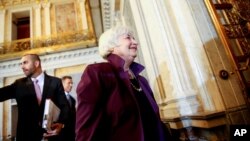The head of the U.S. central bank said she expects the Federal Reserve to start raising the key interest rate “at some point this year.”
U.S. Federal Reserve Chair Janet Yellen told a business group Friday in Rhode Island that she expects the economy to continue improving, ending the need for record-low interest rates.
The Federal Reserve slashed interest rates six years ago to nearly zero to bolster the economy in the midst of recession. Falling unemployment and modestly rising growth eventually will mean the stimulus will no longer be needed, with the central bank allowing interest rates to rise toward their historic averages.
Yellen said continuing the stimulus too long could “overheat” the economy with inflation high enough to hurt growth. She said the decision to raise rates will depend on further economic data, and once rates begin to go up, they will rise “gradually.”
In a VOA interview, the chief economist for PNC Financial Services Group, Stuart Hoffman, said timing the interest rate hike is important because keeping rates “too low for too long” could push inflation higher and faster than is good for stocks, jobs, and the overall economy.
Earlier Friday, a key measure of U.S. inflation showed consumer prices rose one-tenth of one percent in April, as falling energy costs were offset by rising prices for shelter and medical care.
The Bureau of Labor Statistics said prices gained three-tenths of a percent in the overall economy - excluding the food and energy sectors, where prices often are more volatile.
The same "core" measure of inflation shows prices gained 1.8 percent over the past year. That is a bit higher than the previous month, but below the level that U.S. central bank economists say would be best for stable prices and full employment - 2 percent per year.
Meanwhile, the Standard & Poor's rating service cut its forecast of U.S. economic growth by four-tenths of a percentage point, to just 2.4 percent for this year. A separate survey by Fitch Ratings indicated investors are growing more cautious about the U.S. economic outlook.






